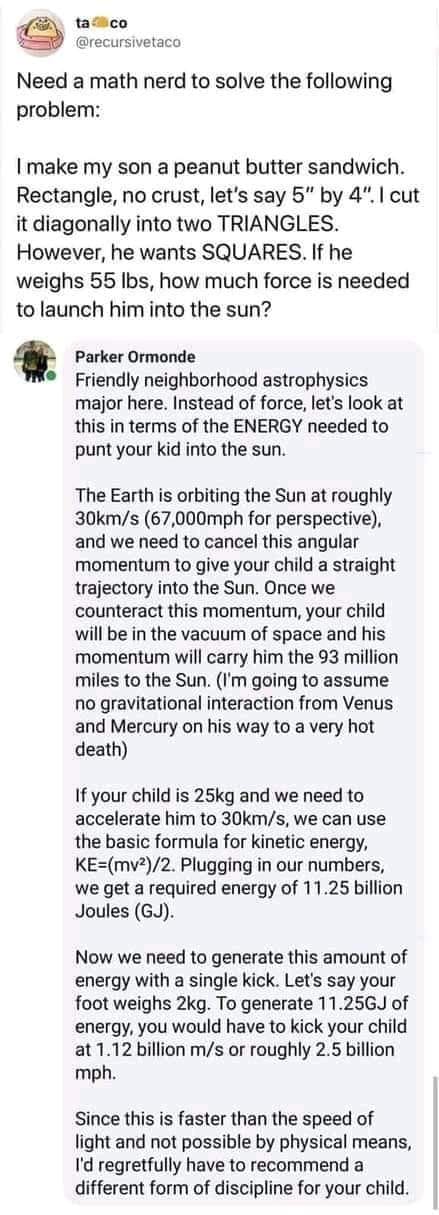this post was submitted on 17 Mar 2024
838 points (97.6% liked)
Science Memes
14730 readers
1535 users here now
Welcome to c/science_memes @ Mander.xyz!
A place for majestic STEMLORD peacocking, as well as memes about the realities of working in a lab.

Rules
- Don't throw mud. Behave like an intellectual and remember the human.
- Keep it rooted (on topic).
- No spam.
- Infographics welcome, get schooled.
This is a science community. We use the Dawkins definition of meme.
Research Committee
Other Mander Communities
Science and Research
Biology and Life Sciences
- [email protected]
- [email protected]
- [email protected]
- [email protected]
- [email protected]
- [email protected]
- [email protected]
- [email protected]
- [email protected]
- [email protected]
- [email protected]
- [email protected]
- [email protected]
- [email protected]
- [email protected]
- [email protected]
- [email protected]
- [email protected]
- [email protected]
- [email protected]
- [email protected]
- [email protected]
- [email protected]
- [email protected]
- !reptiles and [email protected]
Physical Sciences
- [email protected]
- [email protected]
- [email protected]
- [email protected]
- [email protected]
- [email protected]
- [email protected]
- [email protected]
- [email protected]
Humanities and Social Sciences
Practical and Applied Sciences
- !exercise-and [email protected]
- [email protected]
- !self [email protected]
- [email protected]
- [email protected]
- [email protected]
Memes
Miscellaneous
founded 2 years ago
MODERATORS
you are viewing a single comment's thread
view the rest of the comments
view the rest of the comments

Thats inefficient, you dont need to cancel the angular momentum as there was no time limit on how long it takes rhe child to enter the sun and there also was not a specified required trajectory. The child can just spiral into the sun
There are no spiral orbits. Canceling the forward motion is exactly what you need to do, to bring down the next periapsis to 0. Now, you can go with a periapsis of about half a million km, because the sun is pretty big, but that is not a significant difference. Getting anywhere near the sun, is the hard part.
It's much more efficient in this case to do a bi-elliptic transfer: raise apoapsis very far out, then lower your periapsis once you are at apoapsis. Wikipedia says you could do it with about 8.8 km/s delta v. Versus 24 or so for a basic Hohman transfer (still a bit better than 30)
Sadly the bi-elliptic transfer requires two burns so you can't do it with a kick.
Right, I wanted to ask: is that actually the minimum energy to make the child reach the sun? What's the minimum energy to launch something so it reaches the sun?
The minimum would be something like punting your kid to the orbit of Venus for a gravity assist that takes it to one of the outer planets where another gravity assist can push it to the edge of the solar system.
Out there, the angular momentum of the orbiting child will be very low and can be canceled out by a small thrust.
The child will then fall back into the sun. But this requires remote controlled thrusters strapped to the child. And a life support system if you want your child to actually die by burning in the sun. And then, the child will be well into their teens by the time they reach it.
Just tell them to give a small poot on their tenth birthday it's all good
Give them time to think about what they did, maybe learn from it
The speed will be related to escape speed of sun. Based on https://en.m.wikipedia.org/wiki/Escape_velocity It will be Vte which is 16.6 km/s (or Ve 42.1). So when object at earth orbit and has lower speed than 16.6 it can't keep the orbit and will slowly fall into sun.
Right, and what force is acting on the child to make it deviate from a circular orbit into a spiral one?
You could use a gravity assist from another planet
I don't think you can achieve a spiral orbit in an area with so little friction, mostly devoid of dust and gas, else the earth would be on one of those too...